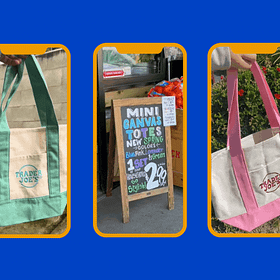Tuesday's Assorted Links
The cost of being nice, rice crisis, BNPL for groceries, blue bubbles, and nervous big brands
Hi y’all! Here are five stories from this week that contain some neat applications of economic principles or are related to teaching:
Saying ‘please’ and ‘thank you’ to ChatGPT costs millions of dollars [USA Today]
Japan has resorted to importing rice from South Korea for the first time since 1999 amid a shortage caused by a record heat that hampered harvests in 2023 [The Guardian]
More Americans are financing groceries with buy now, pay later loans—and more are paying those bills late [CNBC]
How much would an iPhone user need to be paid to let their friends think they have an Android? About $31 per month. [The Economist | NBER Paper]
Big brands are officially worried about American shoppers [NPR]
Trader Joe’s is back in the headlines — but not for frozen orange chicken or cauliflower gnocchi. This time, it’s their $3 mini tote bags sparking a frenzy. Some are now reselling for $400. It feels unfair. But here’s the thing: from an economics standpoint, secondary markets help products get to the people who value them most.
The $3 Tote Bag That Sparked a $400 Frenzy
Last week, Trader Joe’s released its popular mini pastel tote bags—and almost immediately, they started popping up on resale sites like eBay and Facebook Marketplace. The bags retail for $2.99 in your local store. Online, some listings are asking as much as $400.
Are you an educator looking for ways to introduce this week’s newsletter into your classroom? Sign up for the Classroom Edition of Monday Morning Economist to get assessments and lesson plans delivered straight to your inbox every week.




